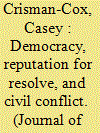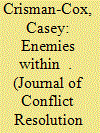| Srl | Item |
| 1 |
ID:
185190


|
|
|
|
|
| Summary/Abstract |
There is a long-running disagreement about how regime type affects a country’s ability to project resolve. Specifically, there is an open question about whether being a democracy helps or hurts a country’s reputation for resolve. I consider this question by directly estimating a state’s reputation for resolve using a unified theoretical and statistical approach. To be precise, I derive an empirical model from a dynamic game of continuous-time bargaining where each side fights in order to build a reputation for resolve. I then fit this model using data on the duration and termination of civil conflicts between 1946 and 2009. I find that while governments tend to have stronger reputations for resolve than the rebels they face, democracies are seen as much less likely to be resolved both prior to and during conflict than their autocratic counterparts. Likewise, democracies are more likely to end a conflict by making a policy change in favor of the rebels than autocracies. Despite these differences, both democracies and autocracies experience a discrete increase in their reputations for resolve once conflict begins, with democracies receiving a much larger boost. As such, these findings contrast with a large literature on democratic credibility theory, while simultaneously providing evidence consistent with some of the logic behind democratic credibility theory.
|
|
|
|
|
|
|
|
|
|
|
|
|
|
|
|
| 2 |
ID:
161595


|
|
|
|
|
| Summary/Abstract |
I examine how the chief executive’s political party affects domestic terrorism within democracies. In particular, I contribute to the literature on terrorism within democracies by arguing that domestic terrorist groups prefer attacking when right-wing parties hold office. I find evidence for this claim as well as results indicating that left-wing executives are more likely to cut deals with domestic terrorist groups. These trends suggest that domestic terrorist groups attack during right-wing governance to build their reputation and reduce violence during left-wing governance to appear moderate and get a deal. These results contribute to literatures on differences between left and right parties, how political institutions affect terrorism, and differences between domestic and transnational terrorism.
|
|
|
|
|
|
|
|
|
|
|
|
|
|
|
|